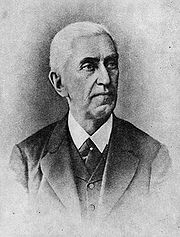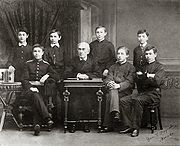
Nikolai Zverev
Encyclopedia

Nikolai Sergeyevich Zverev was a Russia
Russia
Russia or , officially known as both Russia and the Russian Federation , is a country in northern Eurasia. It is a federal semi-presidential republic, comprising 83 federal subjects...
n pianist
Pianist
A pianist is a musician who plays the piano. A professional pianist can perform solo pieces, play with an ensemble or orchestra, or accompany one or more singers, solo instrumentalists, or other performers.-Choice of genres:...
and teacher known for his pupils Alexander Siloti
Alexander Siloti
Alexander Ilyich Siloti was a Russian pianist, conductor and composer. Alexander Ilyich Siloti (also Ziloti, , Aleksandr Iljič Ziloti) (9 October 1863, near Kharkiv - 8 December 1945, New York) was a Russian pianist, conductor and composer. Alexander Ilyich Siloti (also Ziloti, , Aleksandr Iljič...
, Sergei Rachmaninoff
Sergei Rachmaninoff
Sergei Vasilievich Rachmaninoff was a Russian composer, pianist, and conductor. Rachmaninoff is widely considered one of the finest pianists of his day and, as a composer, one of the last great representatives of Romanticism in Russian classical music...
, Alexander Scriabin
Alexander Scriabin
Alexander Nikolayevich Scriabin was a Russian composer and pianist who initially developed a lyrical and idiosyncratic tonal language inspired by the music of Frédéric Chopin. Quite independent of the innovations of Arnold Schoenberg, Scriabin developed an increasingly atonal musical system,...
, Konstantin Igumnov
Konstantin Igumnov
Konstantin Nicolayevich Igumnov was a Russian virtuoso pianist and the teacher of many famous Russian pianists.Igumnov studied under Nikolai Zverev, and at Moscow Conservatory under Alexander Siloti and Pavel Pabst. He took theory and composition courses from Sergei Taneyev, Anton Arensky and...
, Alexander Goldenweiser, and others.
Life
Zverev was born in 1832 in VolokolamskVolokolamsk
Volokolamsk is a town and the administrative center of Volokolamsky District of Moscow Oblast, Russia, located on the Gorodenka River, not far from its confluence with the Lama River, northwest of Moscow. Population: -History:...
, Russia
Russia
Russia or , officially known as both Russia and the Russian Federation , is a country in northern Eurasia. It is a federal semi-presidential republic, comprising 83 federal subjects...
, into an aristocratic
Aristocracy
Aristocracy , is a form of government in which a few elite citizens rule. The term derives from the Greek aristokratia, meaning "rule of the best". In origin in Ancient Greece, it was conceived of as rule by the best qualified citizens, and contrasted with monarchy...
family. He attended Moscow State University
Moscow State University
Lomonosov Moscow State University , previously known as Lomonosov University or MSU , is the largest university in Russia. Founded in 1755, it also claims to be one of the oldest university in Russia and to have the tallest educational building in the world. Its current rector is Viktor Sadovnichiy...
, studying mathematics
Mathematics
Mathematics is the study of quantity, space, structure, and change. Mathematicians seek out patterns and formulate new conjectures. Mathematicians resolve the truth or falsity of conjectures by mathematical proofs, which are arguments sufficient to convince other mathematicians of their validity...
and physics
Physics
Physics is a natural science that involves the study of matter and its motion through spacetime, along with related concepts such as energy and force. More broadly, it is the general analysis of nature, conducted in order to understand how the universe behaves.Physics is one of the oldest academic...
, while taking piano lessons from Alexander Dubuque
Alexandre Dubuque
Alexandre Dubuque, also Alexander and Dubuc , was a 19th century Russian-resident expatriate French pianist, composer and teacher.He was a student of John Field and later gave piano lessons to Mily Balakirev and Nikolai Zverev....
(1812–98). He did not graduate, because he inherited a large family fortune, and moved to Saint Petersburg
Saint Petersburg
Saint Petersburg is a city and a federal subject of Russia located on the Neva River at the head of the Gulf of Finland on the Baltic Sea...
and became a civil servant
Civil service
The term civil service has two distinct meanings:* A branch of governmental service in which individuals are employed on the basis of professional merit as proven by competitive examinations....
. While there, he continued to study piano with Adolf von Henselt
Adolf von Henselt
Adolf von Henselt was a German composer and pianist.-Life:Henselt was born at Schwabach, in Bavaria. At the age of three he began to learn the violin, and at five the piano under Frau von Fladt...
, who emphasized the importance of practice, which was the basis of Zverev's own strict regime that he required of his students. Unsatisfied with civil service, and persuaded by Dubuque, he returned to Moscow
Moscow
Moscow is the capital, the most populous city, and the most populous federal subject of Russia. The city is a major political, economic, cultural, scientific, religious, financial, educational, and transportation centre of Russia and the continent...
in 1867 to become a private teacher. In 1870, Nikolai Rubinstein asked him to teach at the Moscow Conservatory
Moscow Conservatory
The Moscow Conservatory is a higher musical education institution in Moscow, and the second oldest conservatory in Russia after St. Petersburg Conservatory. Along with the St...
, which he did.. Zverev never married, and it has been suggested by scholars such as Faubion Bowers and Max Harrison that he was homosexual and predatory upon the exclusively male students who lodged at his home. Zverev died at the age of 61, in 1893.
Teaching methods

Rachmaninoff's recollections are of interest:
I entered Zverev’s home with a heavy heart and foreboding, having heard tell of his severity and ‘heavy hand’, which he had no qualms of resorting to. Indeed, we were able to witness proof of this latter: Zverev had a temper, and could launch himself at a person fists flailing, or hurl some object at the offender. I myself had been the object of his fury on three or four occasions…
But all other talk of his exacting and severe manner were false. This was a man of rare intellect, generosity and kindness. He commanded a great deal of respect among the best people of his time.
Indeed, discipline entered my life. God forbid that I leave the piano five minutes before my time of three hours was up! Or one uncompleted note – such cases were capable of stirring him up into a fearsome temper. However, all our achievements and diligence paid off: he drove us, his pupils, to various houses with concerts. When I finished playing, Zverev said: “Now that is how one should play the piano!”
The impression was that he was quite mad about us, his pupils. He never took a single coin from us as payment: neither for lessons, nor for board (after all, we lived in his house). He dressed us at the best tailors, we never missed a premiere at Moscow theatres – musical or drama. Of course, no really good concert went unnoticed. And that was a time when there was so much on offer: take the famous historical concerts of Anton Rubinstein, where we had an opportunity to hear all that was the greatest!
Zverev never limited himself to bringing us up as pianists. He did his best to generally give us a good all-round upbringing. He was deeply interested in the kind of reading we did.
Zverev required many things of each student, including mandatory opera
Opera
Opera is an art form in which singers and musicians perform a dramatic work combining text and musical score, usually in a theatrical setting. Opera incorporates many of the elements of spoken theatre, such as acting, scenery, and costumes and sometimes includes dance...
attendances and chamber music
Chamber music
Chamber music is a form of classical music, written for a small group of instruments which traditionally could be accommodated in a palace chamber. Most broadly, it includes any art music that is performed by a small number of performers with one performer to a part...
rehearsals. Throughout the week, his students had to practice many hours, but on Sunday, they would relax, and he would host an open house. In the afternoon and evening, he would invite musical and intellectual figures from all over Moscow. His guests included Pyotr Ilyich Tchaikovsky
Pyotr Ilyich Tchaikovsky
Pyotr Ilyich Tchaikovsky Pyotr Ilyich Tchaikovsky Pyotr Ilyich Tchaikovsky (Russian: Пётр Ильи́ч Чайко́вский ; often "Peter Ilich Tchaikovsky" in English. His names are also transliterated "Piotr" or "Petr"; "Ilitsch", "Il'ich" or "Illyich"; and "Tschaikowski", "Tschaikowsky", "Chajkovskij"...
, Alexander Taneyev
Alexander Taneyev
Alexander Sergeyevich Taneyev was a Russian composer of the late Romantic era, specifically of the nationalist school. Among his best works were three string quartets, believed to have been composed between 1898–1900....
, Anton Arensky
Anton Arensky
Anton Stepanovich Arensky -Biography:Arensky was born in Novgorod, Russia. He was musically precocious and had composed a number of songs and piano pieces by the age of nine...
, Anton Rubinstein
Anton Rubinstein
Anton Grigorevich Rubinstein was a Russian-Jewish pianist, composer and conductor. As a pianist he was regarded as a rival of Franz Liszt, and he ranks amongst the great keyboard virtuosos...
, Vasily Safonov, Alexander Siloti
Alexander Siloti
Alexander Ilyich Siloti was a Russian pianist, conductor and composer. Alexander Ilyich Siloti (also Ziloti, , Aleksandr Iljič Ziloti) (9 October 1863, near Kharkiv - 8 December 1945, New York) was a Russian pianist, conductor and composer. Alexander Ilyich Siloti (also Ziloti, , Aleksandr Iljič...
, and other musicians, actors, lawyers, and professors. During these gatherings, he would allow no one to touch the piano, except to illustrate a point, because it was his students whom the gatherings were for.
Pupils
Zverev took only male students, and referred to them as "cubs" , (his own surname is derived from Russian зверь, meaning beast, or animal). The following were among his prominent students:- Alexander Goldenweiser
- Sergei RachmaninoffSergei RachmaninoffSergei Vasilievich Rachmaninoff was a Russian composer, pianist, and conductor. Rachmaninoff is widely considered one of the finest pianists of his day and, as a composer, one of the last great representatives of Romanticism in Russian classical music...
- Alexander ScriabinAlexander ScriabinAlexander Nikolayevich Scriabin was a Russian composer and pianist who initially developed a lyrical and idiosyncratic tonal language inspired by the music of Frédéric Chopin. Quite independent of the innovations of Arnold Schoenberg, Scriabin developed an increasingly atonal musical system,...
- Alexander SilotiAlexander SilotiAlexander Ilyich Siloti was a Russian pianist, conductor and composer. Alexander Ilyich Siloti (also Ziloti, , Aleksandr Iljič Ziloti) (9 October 1863, near Kharkiv - 8 December 1945, New York) was a Russian pianist, conductor and composer. Alexander Ilyich Siloti (also Ziloti, , Aleksandr Iljič...
- Konstantin IgumnovKonstantin IgumnovKonstantin Nicolayevich Igumnov was a Russian virtuoso pianist and the teacher of many famous Russian pianists.Igumnov studied under Nikolai Zverev, and at Moscow Conservatory under Alexander Siloti and Pavel Pabst. He took theory and composition courses from Sergei Taneyev, Anton Arensky and...
(1873–1948) taught at the Moscow Conservatory, and gave lessons to Natalia Satina, who would become Rachmaninoff's wife. - Fyodor KenemanFyodor KenemanFeodor Feodorovich Koenemann was Russian pianist, composer and music teacher....
(1873–1937) was a friend of Rachmaninoff. - Leonid Maximof (1873–1904) died at age 29, terminating a successful career.
- Matvei Pressman (1870–1937) became Head of the Rostov Conservatory.

